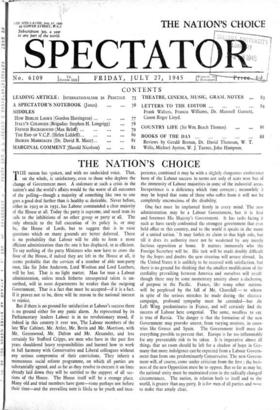THE NATION'S CHOICE
THE nation has spoken, and with no undecided voice. That, on the whole, is satisfactory, even to those who deplore the change of Government most. A stalemate at such a crisis in the nation's and the world's affairs would be the worst of all outcomes of the polling—though a majority of something like two to one goes a good deal farther than is healthy 01 desirable. Never before, either in 1923 or in 1931, has Labour commanded a clear majority of the House at all. Today the party is supreme, and need trim its sails to the inhibitions of no other group or party at all. The only obstacle to the full execution of its policy is, or may be, the House of Lords, but to suggest that is to raise questions which on many grounds are better deferred. There is no probability that Labour will be able to form a more efficient administration than the one it has displaced, or as efficient. To say nothing of the party Ministers who now have to cross the floor of the House, if indeed they are left in the House at all, it seems probable that the services of a number of able non-party men, like Sir John Anderson, Lord Woolton and Lord Leathers, will be lost. That is no light matter. Man for man a Labour administration, unless much hitherto unsuspected talent is un- earthed, will in most departments be weaker than the outgoing Government. That is a fact that must be accepted—if it is a fact. If it proves not to be, there will be reason in the national interest to rejoice.
But if there is no ground for satisfaction at Labour's success there is no ground either for any panic alarm. As represented by its Parliamentary leaders Labour is in no revolutionary mood, if indeed in this country it ever was, The Labour members of the late War Cabinet, Mr. Attlee, Mr. Bevin and Mr. Morrison, with Mr. Greenwood, Mr. Dalton and Mr. Alexander, and less certainly Sir Stafford Cripps, are men who have in the past five years shouldered heavy responsibilities and learned how to work in full harmony with Conservative and Liberal colleagues without any serious compromise of their convictions. They inherit a momentous social reform programme, on which all parties are substantially agreed, and so far as they resolve to execute it on lines already laid down they will be entitled to the support of all sec- tions of the House. The House itself will be a strange place.
Many old and tried members have gone—some perhaps not before their time—and the prevailing note is likely to be youth and inex- perience, combined it may be with a slightly dangerous exuberance born of the Labour success in terms not only of seats won but of the immensity of Labour majorities in some of the industrial areas. Inexperience is a deficiency which time corrects ; meanwhile it may be hoped that some of those who suffer from it will not be completely unconscious of the disability.
One fact must be implanted firmly in every mind. The new administration may be a Labour Government, but it is first and foremost His Majesty's Government. It has tasks facing it such as have rarely confronted the strongest government that eves held office in this country, and to the world it speaks in the name of a united nation. It may forfeit its claim to that high role, but till it does its authority must not be weakened by any merely factious opposition at home. It matters immensely who the Foreign Secretary will be. His task will be made doubly difficult by the hopes and doubts the new situation will arouse abroad. In the United States it is unlikely to be received with satisfaction, but there is no ground for thinking that the smallest modification of the cordiality prevailiing between America and ourselves will result though there may be some momentary anxiety about a slackening of purpose in the Pacific. France, like many other nations will be perplexed by the fall of Mr. Churchill — to whom in spite of the serious mistakes he made during the electora campaign, profound sympathy must be extended—but the Left Wing predominates in France, and will certainly find the success of Labour here congenial. The same, needless to say, is true of Russia. The danger is that the formation of the nevi Government may provoke unrest, from varying motives, in coun- tries like Greece and Spain. The Government itself must do everything possible to prevent that. Europe is far too inflammable for any preventable risk to be taken. It is imperative above all things that no room should be left for a shadow of hope in Ger- many that more indulgence can be expected from a Labour Govern- ment than from one predominantly Conservative. The new Govern- ment will, of course, come under criticism from the first ; the busi- ness of the new Opposition must be to oppose. But so far as may be, the national unity must be maintained even in the radically changed circumstances. The nation, in relation both to itself and to the world, is greater than any party. It is for men of all parties and none to make that amply clear.


























